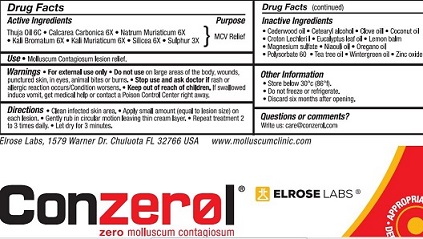Elrose Labs | Conzerol Cream while Breastfeeding

What is Elrose Labs | Conzerol Cream used for?
Brief: MCV Relief
I am breastfeeding mother and I am using Elrose Labs | Conzerol Cream. Can it have any bad effect on my kid? Shall I search for better alternative?

Note: Due to high dilution of active ingredients in homeopathic medicines most homeopathic medicines are safe while breastfeeding.
Elrose Labs | Conzerol Cream Breastfeeding Analsys
Silicon dioxide while Breastfeeding
SafeA polymer made out of silicon-oxygen-methyl combination with a high molecular weight, water repellent and low superficial tension. It is used in many ways (dimethicone, simethicone, -see specific items)orally to treat infant colic and flatulence; as pediculicide, in cosmetic creams and lotions and skin protectants as to prevent ulcers and scars; arthroplasties, retinal detachments and reconstruction or cosmetic surgery as injections and implants. Silicone is widely distributed in our environment with several cosmetic and medicinal uses. No evidence of toxicity on human tissues has been shown. A 1994 report on immunological side effects in infants breastfed by mothers with silicone implants, was denied categorically by means of meta-analysis and other work. The absorption by oral or dermal route is negligible. Both a high molecular weight and polymer molecular structure make it practically impossible excretion in the milk and hence a significant amount of intestinal absorption by the infant. Those circumstances make silicone implants safe for lactation even if broken or manufacturing fault (Poly Implant Prothèse, PIP). After extensive analysis of such silicone prosthesis, where lack of health risk was demonstrated, it can be concluded that many of the initial recommendations published lacked scientific validity, including that carriers of such prosthesis should not breastfeed. Silicon levels in blood and milk of women with implants (55 ng / ml) are similar to those of women without implants (51 ng / ml), 13 times lower than that found in cow's milk (709 ng / ml) and 80 times lower than in commercial infant formulas (4403 ng / ml). American Academy of Pediatrics: Product usually compatible with breastfeeding. To view other possible effects on breastfeeding of breast implant unrelated to silicone, see the term 'Augmentation Mammoplasty'. See below the information of these related products:
Oyster shell calcium carbonate, crude while Breastfeeding
SafeCAS Number: 471-34-1
Various calcium salts (Acetate, Carbonate, Chloride, Citrate, Phosphate, Gluceptate, Glucobionato, Lactate, Laxctobionato Pidolate, Silicate) are used in the management of hypocalcemia, supplements for treating calcium deficiency states and antacids ( Carbonate and Silicate) Daily requirement of calcium during lactation are 1 g (1.3 g in children under 20 years).Calcium supplements in the diet does not affect the concentration of calcium in milk.Excessive intake of calcium is not good for health. During lactation, consumption of calcium should not exceed 2.5 g a day. WHO List of Essential Medicines 2002 states that it is compatible with breastfeeding.
Sodium chloride while Breastfeeding
SafeCAS Number: 7647-14-5
Sodium chloride either as cooking salt, or, as oral rehydration solution, or, as IV fluid, is entirely compatible with BF.
Potassium cation while Breastfeeding
SafeCAS Number: 7447-40-7
Human milk has a potassium concentration of 13 meq/L, almost a half of rehydration solution content and a quarter of maximal IV recommended dose. Potassium supplementation does not alter milk concentration without increasing mother’s serum concentration, which is strictly limited from 3,5 to 5,5 meq/L.
Potassium bromide while Breastfeeding
SafeCAS Number: 7447-40-7
Human milk has a potassium concentration of 13 meq/L, almost a half of rehydration solution content and a quarter of maximal IV recommended dose. Potassium supplementation does not alter milk concentration without increasing mother’s serum concentration, which is strictly limited from 3,5 to 5,5 meq/L.
I already used Elrose Labs | Conzerol Cream and meanwhile I breastfed my baby should I be concerned?
Homeopathic medicines usually do not cause harmful effects on breastfed babies. Elrose Labs | Conzerol Cream is a homeopathic medicine and if your baby does not have any abnormal symptoms then there is nothing to worry about. Some homeopathic medicines contain alcohol (ethanol) and such homeopathic medicines in high dosage can have bad effect on development of baby.
I am nursing mother and my doctor has suggested me to use Elrose Labs | Conzerol Cream, is it safe?
Homeopathic medicines are usually safe in breastfeeding and if Elrose Labs | Conzerol Cream has been recommended by doctor then there should be no doubt about its usage in breastfeeding.
If I am using Elrose Labs | Conzerol Cream, will my baby need extra monitoring?
Not really.
Who can I talk to if I have questions about usage of Elrose Labs | Conzerol Cream in breastfeeding?
US
National Womens Health and Breastfeeding Helpline: 800-994-9662 (TDD 888-220-5446) 9 a.m. and 6 p.m. ET, Monday through Friday
UK
National Breastfeeding Helpline: 0300-100-0212 9.30am to 9.30pm, daily
Association of Breastfeeding Mothers: 0300-330-5453
La Leche League: 0345-120-2918
The Breastfeeding Network supporter line in Bengali and Sylheti: 0300-456-2421
National Childbirth Trust (NCT): 0300-330-0700
Australia
National Breastfeeding Helpline: 1800-686-268 24 hours a day, 7 days a week
Canada
Telehealth Ontario for breastfeeding: 1-866-797-0000 24 hours a day, 7 days a week
